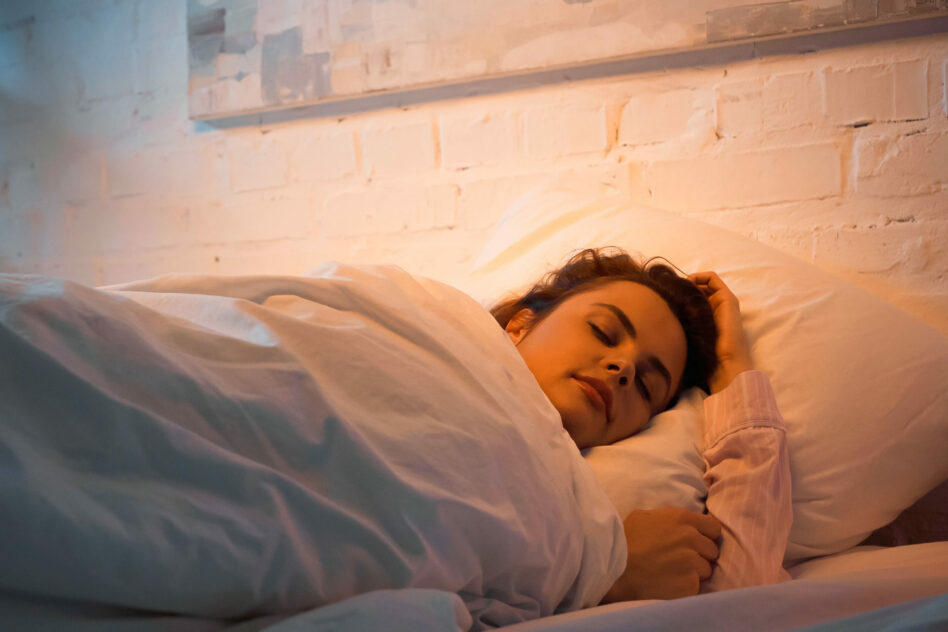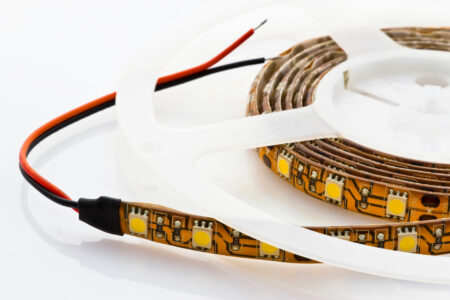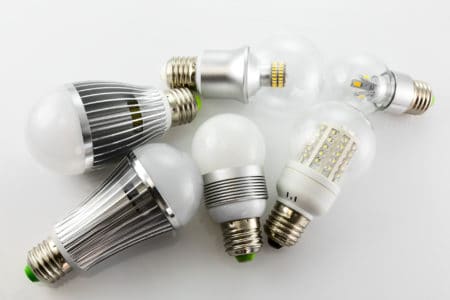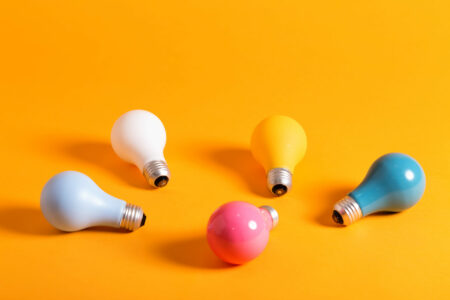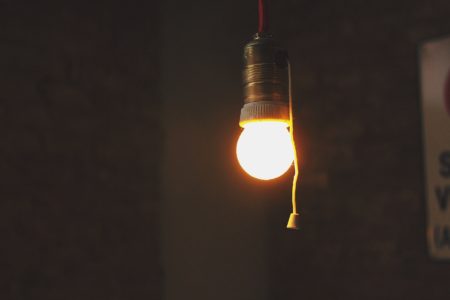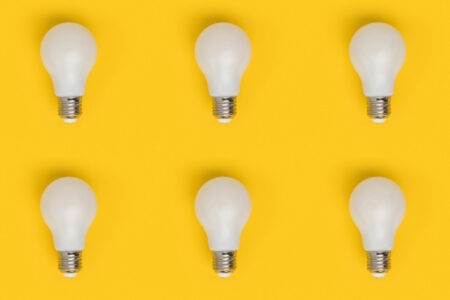Have you ever left the lights on at night only to wake up feeling like you didn’t sleep? Well, you’re not alone. Though you might not feel it, LED lights keep your body awake all night! So you may wonder if you can you sleep with LED lights on? Keep reading this article to know exactly how LED lights influence your body!
Should You Sleep with LED Lights On?
If you want a good night’s sleep, turn all lights off, especially LED lights. That doesn’t mean you won’t be able to fall asleep with the LED lights on. Still, the extra light will affect the quality of your precious sleep.
So, it’s best to turn off all lights, or at least dim them, for an hour or two before bedtime. This way, you’ll adequately prepare your body for sleep.
In fact, a tiny glare from the street can significantly impact your sleep cycle. So, blackout curtains can significantly help, even if you don’t plan to snooze through the morning!
Why You Should Turn LED Lights Off Before Sleeping
Our bodies are pretty smart! They know the appropriate time for sleeping and waking up. This process is called the circadian rhythm. The circadian rhythm responds to light, signaling your body to wake up when it’s bright and fall asleep during the dark.
Keeping the lights on at night can throw off your biological clock, so you’ll feel more tired and groggy throughout the day. LED lights, in particular, can be incredibly stimulating. That’s because LED lights are blue.
Exposure to blue lights might completely disrupt our normal bodily functions. This means that LED lights aren’t the only thing that can influence your sleep, but also your phone or TV screen.
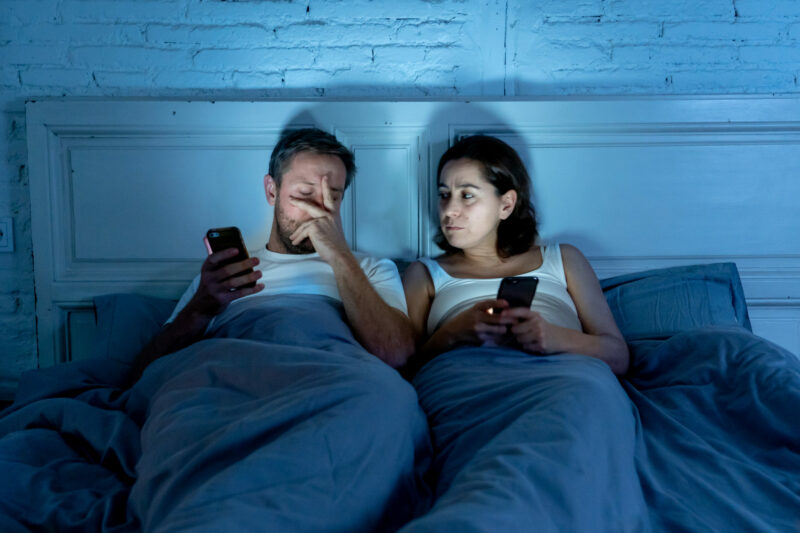
What Are the Effects of LED Lights?
Low-quality sleep will definitely make you feel tired throughout the day. Yet, LED lights have numerous other physiological effects that can impact your biological clock and your overall well-being.
Here are all the different ways LED lights might affect our bodies:
Decrease Melatonin
Keeping the LED lights on while sleeping will basically put your body in alert mode. This results in the disruption of numerous hormones.
Melatonin is also known as the sleep hormone. Typically, your body releases melatonin at night, which makes you feel sleepy! Once melatonin levels decrease, you’ll feel more alert and awake. LED lights inhibit the normal production and release of melatonin.
Increase Adrenaline
Adrenaline is another hormone that exposure to LED lights might alter. We all know adrenaline is the stress hormone. When its levels rise, you’ll feel on edge.
The reason adrenaline is released is that LED lights stimulate an area in the brain called the suprachiasmatic nucleus. This area is the central pacemaker of the circadian rhythm, controlling the different sleep hormones.
Feeling calm after a surge of adrenaline isn’t easy. For starters, you’ll need to have a serene environment by turning off the lights!
Disrupt Circadian Rhythm
Since LED lights disrupt hormones and stimulate the suprachiasmatic nucleus, you’ll need to wake up later to be well-rested. Over time, this will completely throw off your biological clock.
The altered circadian rhythm will have you feeling sleepy much later than usual. It’ll also prevent you from naturally feeling alert in the morning. This can be a huge issue, especially if you have to work early.
Resetting your circadian rhythm back to normal can be difficult. Even if you start sleeping with the lights off, your body will have gotten used to the late schedule, keeping you up all night.
Prolong Sleep Latency
Sleep latency is the time it takes you to sleep. While different people have different sleep onset latencies, prolonged sleep latency is a sign of insomnia. Generally, it’d take you about 20 minutes to fall asleep.
Yet, if you sleep with LED lights on, it’ll take much longer for you to fall into a deep slumber. As a matter of fact, frequent exposure to LED lights can also increase sleep latency, even if you sleep in a dark room. That’s why we recommend dimming the lights at night.
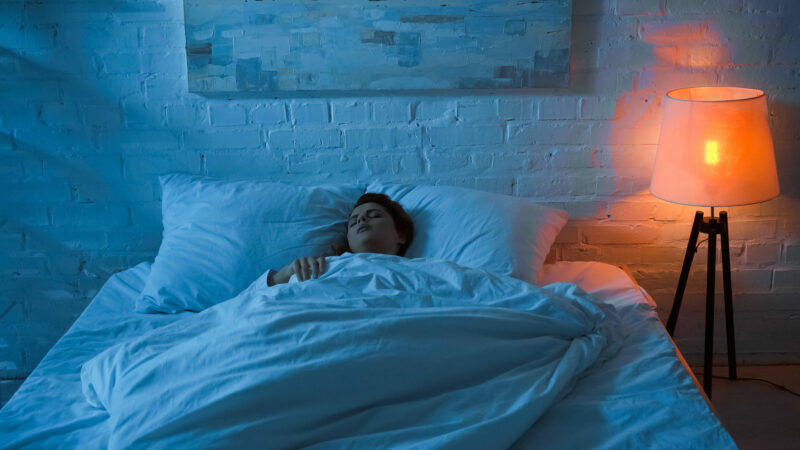
Decrease REM Sleep
We go through two different phases during a sleep cycle. The non-rapid eye movement (NREM) phase is a light sleep during which you can easily wake up. On the other hand, rapid eye movement (REM) sleep is the deepest stage of sleep, at which dreaming occurs. It happens about 90 minutes after falling asleep.
Naturally, when the lights are on, you’ll keep waking up, though you won’t remember it. So, you won’t really reach the deep, relaxing REM sleep. Getting less REM sleep means you’ll wake up exhausted and disoriented. Additionally, you won’t experience all the exciting dreams, which might result in memory problems and decreased creativity!
Disrupt Moods
Sleeping with LED lights on is a sure way to throw your hormones and neurotransmitters into disarray. You won’t only feel more drowsy throughout the day, but you’ll experience various mood swings!
On one hand, the blue hue from LED lights might exacerbate any pre-existing mental condition. On the other hand, the lack of sleep, especially deep REM sleep, can cause moodiness and irritability.
In addition, children who sleep with LED lights on won’t get enough sleep, making them hyperactive and more prone to aggravated ADHD.
Raise Blood Sugar and Heart Rate
If you have a pre-existing heart condition, then you definitely shouldn’t be sleeping with LED lights on. Exposure to LED lights at night can increase the risk of diabetes and heart disease.
Studies show that sleeping with the lights on for only one night impairs glucose and cardiovascular regulation. In other words, both your blood sugar levels and your heart rate will rise. That’s only natural since more adrenaline is released in the presence of LED lights, and adrenaline increases heart rate.
Furthermore, while you might be asleep, your body doesn’t act like it! So, it’ll release more glucose into the bloodstream instead of reserving energy. Over time, this might lead to insulin resistance.
What Lights Can You Have On While Sleeping?
Some people prefer to keep the lights on. Additionally, children might get scared by the total darkness. Simply put, lights can be pretty comforting. Still, sleeping with a glare of blue LED lights can negatively affect your slumber. Unfortunately, this means that even dimming the light will still mess up your biological clock.
There are certain types of light that won’t negatively influence your sleep cycle. Alternatively, these lights might help you sleep better! Warm lights can have a soothing effect, and aid in muscle relaxation. Studies suggest that having red lights in the bedroom can stimulate melatonin production, helping you fall asleep faster.
That’s why warm lights, particularly red, are used in light therapy. This therapy helps treat seasonal mood disorders and insomnia. While turning off the lights before bedtime is best, you can still take other measures for a good night’s sleep. This includes the following:
- Dim the lights a couple of hours before bedtime.
- Remove all electronics from the bedroom at night.
- Maintain your sleep schedule by going to sleep and waking up at the same time.
- Try relaxing activities before sleeping, such as reading or meditating.
- Don’t consume large meals or caffeinated beverages for at least four hours before bedtime.
